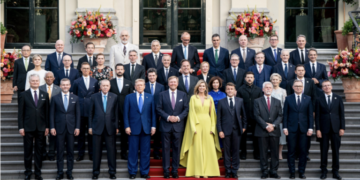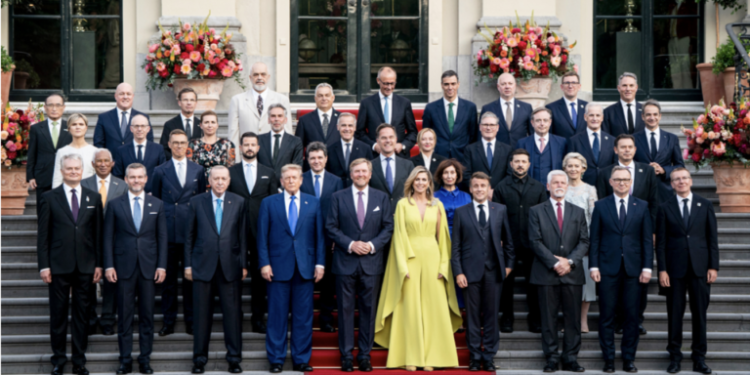This year’s NATO Summit in The Hague features some unique aspects. A key agenda item—the increase of member states’ defense spending to 5% of GDP by 2035—has already been settled, with Spain being the only exception, having requested and received flexibility.
Notably, this summit is unprecedented in its brevity, lasting only three hours. Secretary-General Mark Rutte has organized a series of side events starting on Monday. The abbreviated schedule is aimed at preventing any boredom for the summit’s prominent figure, U.S. President Donald Trump, who is visiting Europe for the first time in his second term.
Until now, Trump has only sent Vice President J.D. Vance, who notably disrupted the Munich Security Conference earlier this year, causing unrest with his comments concerning the Alternative for Germany party during the federal elections. This time, however, Trump appears as a peacemaker, positively engaging with his “European friends” and expressing satisfaction that NATO allies are responding to his long-standing call to increase their contributions—targeting an ambitious 5% compared to the current 2% benchmark.
As the summit’s headliner, Trump arrived in the Netherlands last night just after 20:30, traveling directly from Amsterdam’s Schiphol Airport to Huis ten Bosch Palace. He is the only leader being hosted by the royal family—King Willem-Alexander and Queen Máxima—without his wife by his side.
Meetings and Article 5
Trump is expected to make a strong impression at the summit, which kicks off with leaders’ statements shortly after 10:00 Greek time and concludes by 15:00. He is in high demand for meetings, anticipated to connect face-to-face with leaders including his longtime associate Recep Tayyip Erdoğan, whom he dined alongside last night. He is also expected to engage with Volodymyr Zelensky, who, while not part of the official proceedings, will remain in The Hague for a one-on-one meeting with Trump. Several European leaders have already met with Trump, notably Italy’s Prime Minister Giorgia Meloni, who shares a close bond with him and sat next to him at dinner.
At the summit, amid discussions about the Middle East, Trump raised eyebrows with his comments regarding NATO’s Article 5—the collective defense clause. When queried about U.S. commitment to Article 5, he replied ambiguously: “It depends on the definition. There are several interpretations of Article 5. But I am committed to being their friend and to saving lives. I am committed to life and security,” he stated to reporters, indicating he would define his stance more clearly during the summit, rather than on a plane.
The Greek Position
In this context, Prime Minister Mitsotakis, who also arrived in The Hague last night, approaches the topic of increased defense spending confidently. Mitsotakis has consistently acknowledged the validity of Trump’s concerns raised during his first term, though the ongoing Ukraine conflict has significantly shifted the landscape.
During his address at the summit, Mitsotakis is expected to highlight Greece’s stability and reliability as an ally, noting his country has met the NATO commitment of 2% GDP defense spending even during challenging economic times, thereby enhancing the Alliance’s capabilities in a crucial area for both regional and international security. He will reference recent events in the Middle East, stressing that Greece allocates 3% of its GDP to defense in light of multiple security threats—placing it among NATO’s elite group exceeding the 2% commitment, and ranking 5th in defense spending as a percentage of GDP. The Prime Minister will also mention the country’s 12-year, €25 billion military modernization program.
Mitsotakis is expected to meet with Canadian Prime Minister Mark Carney on the sidelines and possibly connect with other leaders, although no formal meeting with Turkish President Erdoğan is on the agenda.
Ask me anything
Explore related questions

















